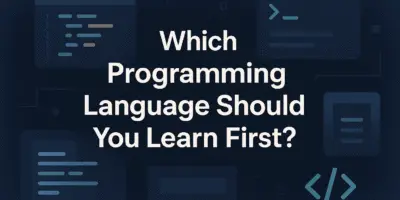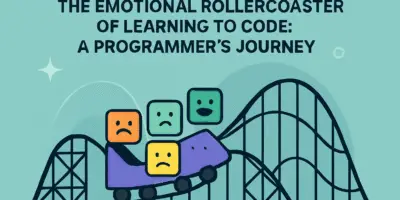Are you tired of seeing the same anxious comments every time a new AI model launches? You know the ones: “Is AI going to replace programmers?” or “Why should I even learn coding if AI can write code now?” I get it. I was in that worried camp too once.
But after using AI almost daily for two years, I’ve completely changed my perspective. In fact, now I can barely imagine how I managed before AI tools became part of my workflow. Whenever I think about the tasks AI helps me with now, I realize I wasn’t just surviving before—I was some kind of superhuman for getting anything done at all!
This mindset shift reveals something important: many of us fundamentally misunderstand what AI actually is and how it relates to programming. In this post, I’ll share my real-world experience as a programmer who’s integrated AI into their daily work for two years. I’ll show you the moments where it genuinely transformed my workflow, why I believe it’s arguably the most essential tool every programmer should have, and the stark difference between developers who use AI and those who don’t.
Let’s dive in!
Table of Contents
- Understanding AI and Its Limitations
- AI: Your Assistant, Not Your Replacement
- Real-World AI Use Cases That Changed My Development Process
- The Productivity Gap: AI Users vs. Non-AI Users
- Dispelling Naive AI Expectations
- The Undeniable Need for Programming Knowledge
- The Before-AI Era: We Were All Heroes
- The Bottom Line
Understanding AI and Its Limitations
First, we need to get something straight: AI is not your competitor.
It’s not some super-smart programmer coming to take your job, nor is it a conscious entity capable of independent thought. In fact, the word “thinking” is what causes most of the confusion we’re dealing with.
When I hear someone say “AI thinks,” I want to say, “Please stop—you’ve already lost me.” Real thinking involves awareness, consciousness, and the ability to form original ideas independently. It means understanding the world through consciousness, creativity, personal experiences, and memories. It means making decisions based on values and principles.
AI has none of these qualities. What it does have is an impressive ability to process enormous amounts of data at incredible speeds—but without any of the qualities that make human thinking unique.
When you ask ChatGPT a question, it’s not thinking about the answer. It’s analyzing millions of responses it was trained on and selecting the most appropriate one based on statistics, or generating something new based on patterns it’s learned. Just because it can respond in your language (and even your dialect, making it sound like someone from your neighborhood) doesn’t mean it’s thinking.
To be precise, we should say it processes data extremely quickly and mimics human thought patterns—but it doesn’t understand or think about information the way humans do.
AI: Your Assistant, Not Your Replacement
Here’s the crucial insight: AI is a tool that helps you, not replaces you.
Instead of spending three hours searching for a solution to a problem, AI can give you an answer in seconds. Rather than starting a project from absolute zero, AI can provide you with a starting point that you can build upon and customize. But at the end of the day, you’re still the one thinking, deciding, and driving the project forward. You’re the one holding the steering wheel.
Before AI, when you encountered a bug, you’d probably open a hundred Chrome tabs searching Stack Overflow and other resources, trying every possible solution until you found the right one. Now? I can simply ask ChatGPT or GitHub Copilot how to write a specific query in MongoDB, for example, and instantly get an example, explanation, and sometimes even suggestions for improvements I wouldn’t have thought of myself.
Is that threatening? Quite the opposite! It makes me faster, more efficient, and significantly more productive.
Real-World AI Use Cases That Changed My Development Process
Let me share some of the most impactful ways I use AI in my daily programming work:
1. Writing Boilerplate Code
Remember when starting a new project meant manually writing all the boilerplate code, repeating the same lines over and over? Those days are gone for me. Now I use Copilot or ChatGPT to generate that basic structure, then I build on top of it.
For example, if I’m writing a REST API in Express.js, instead of coding each route from scratch, I can ask AI to create them for me, and then I add the project-specific details and logic.
2. Understanding Legacy Code
This might be my favorite use case. We’ve all been there—inheriting code written by another developer that feels like solving a puzzle. Everything’s tangled up, there are no comments, you know nothing about the project, and it might even be written in an outdated programming language.
Now I can use AI to summarize the code, explain what it does, describe what each function does, and even create detailed documentation about the entire project. Within minutes, I understand the project from top to bottom, something that used to take days or weeks.
3. Optimizing Code Performance
If I write some JavaScript code that implements a filter operation but runs too slowly, I can ask AI what might be causing the performance issues and how to improve them. It will analyze my code, identify bottlenecks, and suggest specific optimizations with explanations of why they’ll help.
The Productivity Gap: AI Users vs. Non-AI Users
Imagine two programmers:
Programmer A does everything manually—writing code from scratch, debugging without assistance, spending hours understanding other people’s code.
Programmer B leverages AI—generating starter code, getting instant debugging help, and quickly making sense of complex systems.
Which one do you think is more productive? Without question, the AI-empowered programmer completes tasks faster, has access to a wider range of solutions, can understand anyone else’s code in minutes, and can even get fresh ideas and approaches they might not have considered.
Dispelling Naive AI Expectations
Let’s be honest: some people have ridiculously unrealistic expectations about AI. They imagine a programmer in the AI age waking up, opening their laptop, and saying, “Good morning, ChatGPT! I need an Amazon-like website by lunchtime, and please make me a coffee while my code compiles.”
That’s pure science fiction—at least for now.
If you ask AI to write code for a specific project, it will give you a basic structure or skeleton, but it’s practically impossible to get a 100% ready, bug-free solution you can use immediately. You’ll always need to modify it, fix issues, or at least test it thoroughly.
Thinking you no longer need to learn coding because “AI can do it” is a terrible misconception. It’s one of those psychological tricks we play on ourselves to avoid learning. If AI didn’t exist, you’d probably find some other excuse not to learn programming.
Here’s a historical parallel: When Adobe Dreamweaver came out in 1997—over 25 years ago!—it offered a visual GUI editor that could create web pages without writing code. Imagine if someone back then had said, “Coding is unnecessary now because Dreamweaver can make web pages without code.” We wouldn’t have all the developers who are essential to today’s digital world!
The Undeniable Need for Programming Knowledge
Picture this: you ask ChatGPT to write code for a food delivery service like Talabat. Yes, it will generate code, but is that code ready for deployment? Absolutely not!
You still need to:
- Verify it’s secure
- Test its performance
- Ensure it meets client requirements
- Check if it’s scalable
- Make sure it aligns with the specific business logic
AI doesn’t understand your project the way you do. It doesn’t know your client’s requirements. It can’t understand the complete business logic or solve runtime issues automatically. You always need to be present and understand the results it produces, which means you must understand code.
The Before-AI Era: We Were All Heroes
Looking back at how I worked before AI became part of my daily routine, I’m genuinely amazed. The amount of time I wasted on tedious, boring tasks, endlessly searching for solutions to problems that now get solved in seconds—I must have been some kind of superhero to get anything done!
Now I have a free personal assistant doing everything I need, and that’s not all. AI helps me organize my projects better and helps me write professional emails. I literally don’t waste any time writing or responding to emails anymore—I tell the AI what I want to say, and it formats everything for me.
So rather than asking, “How will I find work in the age of AI?” the real question should be, “How on earth did I work before AI existed?”
Trust me, AI isn’t some boogeyman coming to take your job. Stop making excuses not to learn programming—AI is your ally, not your replacement.
The Bottom Line
After two years of integrating AI into my daily programming workflow, I can confidently say it’s one of the most powerful productivity tools I’ve ever used. It hasn’t replaced my skills—it’s amplified them. It hasn’t made my knowledge obsolete—it’s made it more valuable because I know how to direct and leverage AI effectively.
For programmers just starting out or those hesitant about embracing these tools: don’t fear AI, learn to work with it. The future belongs not to those who can code or those who can use AI, but to those who can do both seamlessly.
What about you? How has AI assisted you in your work or added value to your life? I’d love to hear your experiences!



